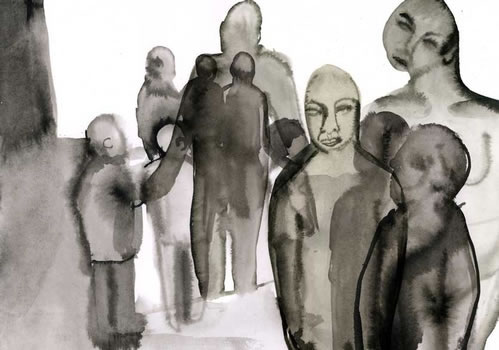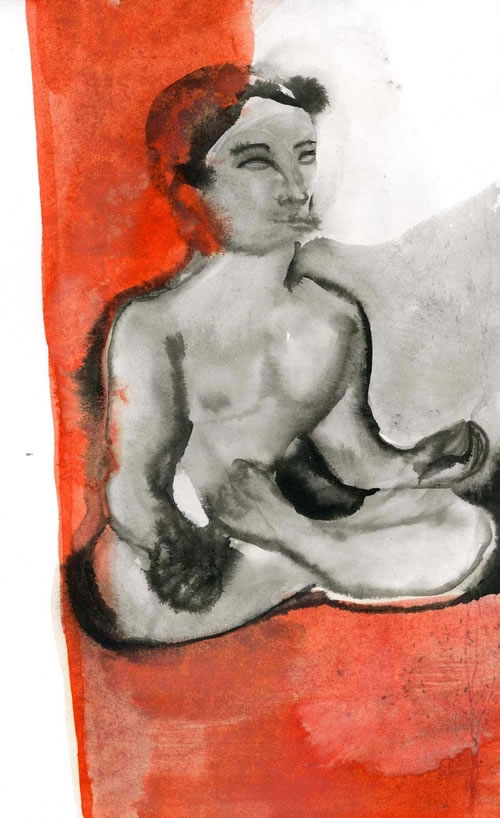 Humanists take great pride in the secular form of their ethics. They welcome the replacement of religious edicts and god-given rights with an “ethic of humanity”, the sort of ethics embodied in The Universal Declaration of Human Rights, adopted and proclaimed by the United Nations 60 years ago this December. The bedrock is an appeal to the fact of human nature. Accordingly its language is secular and entitlement depends upon nothing more than the fact of birth. “All human beings are born free and equal in dignity and rights” and all human beings “should act towards one another in a spirit of brotherhood.”
Humanists take great pride in the secular form of their ethics. They welcome the replacement of religious edicts and god-given rights with an “ethic of humanity”, the sort of ethics embodied in The Universal Declaration of Human Rights, adopted and proclaimed by the United Nations 60 years ago this December. The bedrock is an appeal to the fact of human nature. Accordingly its language is secular and entitlement depends upon nothing more than the fact of birth. “All human beings are born free and equal in dignity and rights” and all human beings “should act towards one another in a spirit of brotherhood.”
Now, historically, of course, such universals were located within the realm of the sacred, in the “golden rule” of Christianity: “Do unto others as you would have them do unto you”. With the decline of this version of Christianity, the ethic of reciprocity has progressively lost its grounding in the transcendent. The difference can be seen in the comparison between the American Declaration of Independence of 1776 – which states that “All men are endowed by their Creator” – and the UN Declaration of 1948 which has no such appeal to transcendent entities. The shift has been away from the claim that certain rights exist independently of, or prior to, the law by virtue of the fact that they are a gift from God and towards the law of legal positivism, namely the claim that rights derive from judicial decisions and legislative acts, extrinsic to the individual in that they are derived from the operation of the legal system itself.
But though the ethic of humanity occupies the same terrain as religiously inspired moral systems, it can lack the powerful appeal to personal emotional values that underpins religious injunctions. Too often institutionalised as a complex of rules, regulations and codes of practice within legal or quasi-legal systems, the secular ethic generally takes an abstract, formal, “cold” form. Significant values tend to get lost in a morass of technicality. Sanctions might force people to show respect to others in the workplace, for example, but are unlikely to do much to encourage anyone to feel respect, “from the heart”. The dictates of the law are not especially effective in transforming the obligatory into the authentic. Rather than inspiring commitment, the experience is frequently one of “Help! Not another damn cultural sensitivity regulation”. Money cannot buy your love; neither can the law demand it.
The barren, disembodied formalism of the law, the relative obscurity of formulations like those of the UN, the limited persuasiveness of scientific findings, and the relatively ineffectual role played by the vulnerability factor add up to one thing: in secular mode, the ethic of humanity does not serve as an especially authoritative source of ethical consciousness and action. Evidence that the ethic in secular form has not taken root as deeply as it could or should, as a “habit of the heart”, is demonstrated by the amount of contemporary transgression of human rights, by the banal ubiquity of prejudice, domination and inhumanity. Indeed, it could be argued that if the ethic had taken deeper root, the proliferation of legal or quasi-legal systems, which we use to address these transgressions, would not be necessary.
 And this is where I believe a particular form of spirituality can improve the situation: a form which can do a considerable amount to assist ethical humanism; a form which can at least go some way to serve as a functional equivalent of what was traditionally in the hands of the religious sacred. I refer to the collection of practices, beliefs and activities known as “New Age”.
And this is where I believe a particular form of spirituality can improve the situation: a form which can do a considerable amount to assist ethical humanism; a form which can at least go some way to serve as a functional equivalent of what was traditionally in the hands of the religious sacred. I refer to the collection of practices, beliefs and activities known as “New Age”.
New Age spiritualities are routinely dismissed more or less in toto. The customary mode is scorn, such as that displayed by Natalie Haynes writing about her visit to the Mystic Arts Exhibition in the previous issue of this magazine. The naïve and misguided disciples of “woo”, as she disparagingly calls it, have nothing to offer the “good life” of the humanist. They are judged trivial, silly and replete with mumbo-jumbo, merely contributing to hedonistic, egotistical consumer culture in subjective wellbeing purchasing mode.
Such criticisms are easily made, and it would be foolish to deny that the world of New Age is well populated with charlatans and hucksters, making exaggerated if not outright fraudulent claims on behalf of their various gee-gaws and techniques. But this is by no means the end of the story, and in particular it misses out two vital components. The first is to do with the motivations of those drawn to New Age, the quality of their quest for knowledge and spiritual nourishment. The second is about the efficacy of faith.
What is the basis of the secular humanist ethic if not the quest for a good life, to live in a way consistent with an evolved sense of the universe and humanity? Why then do humanists rush so quickly to dismiss those who seek precisely these things in New Age? Does hedonistic consumerism or selfishness really account for the entire parcel of motivations which drive millions to “alternative” spiritualities? According to a number of research projects, those participating in mind-body-spirituality activities are drawn from the ranks of teachers, counsellors, therapists, nurses, hospice personnel, the retired and professionals who have downsized. Predominantly women, these are well-educated people with a higher than average interest in, and dedication to, their fellow humans, who are interested in increasing the sum of human happiness. The accusation of self-indulgence seems particularly inappropriate in relation to the growing use of these alternative forms of spirituality in palliative care, for example with cancer sufferers.
Even the silliest of beliefs attached to New Age might not be as ridiculous as rationalists think. Faced with someone who purchases a £3 feng shui kit to use for gardening, the secularist critic objects: why on earth should someone buy the kit when it cannot possibly change the plants for the better? Well, even if the purchaser is intent on practicing “magic” to alter plants themselves, it is likely that the kit also enables them to experience a greater sense of integration, harmony and tranquillity. No matter the efficacy of the feng shui. It is likely that their garden will flourish under their increased care and attention. So long as the purchaser has faith in the kit, the meanings and values associated with feng shui could well have very positive effects in ways which are not reducible to mere consumerism or irrationality.
By definition, atheists reject the idea that spirituality exists in and of itself. The counter-argument is that regardless of whether inner-spirituality actually exists (an issue which can never be settled by academic inquiry), it certainly exists as a form of meaningful reality. And meanings matter. In a manner akin to the placebo effect the meanings – more exactly the meaningful experiences – found embedded in this kind of spirituality can, and do, make a difference. In a fundamental sense, to experience oneself as more peaceful, more at ease with one’s aching body or more loving is to be more peaceful, at ease, more loving – quite probably to be a better person as a result.
A growing body of detailed empirical research, most notably that of the social psychologist Miguel Farias, suggests that spiritually orientated participants who cultivate and express their humanistic virtues by way of practising New Age activities are more likely to hold universalistic human values and engage in “good work”. Atheistic humanists might well continue to reject spirituality in connection with their own lives. But it is surely not in order to dismiss the significance of spiritually suffused meaningful realities for others.
If all this talk of spirit seems wistful or simply stupid, it is worth noting that these ideas were first mooted by many who are taken seriously as poets of secular humanism. Among the Romantics, those great precursors of contemporary spiritualities, Rousseau wrote of “the religion of man”; Wordsworth took “the spirit of life” as the primary, experiential source of his radical, activist, expressive humanism. Among positivistic precursors, who were nevertheless also responding to perceived inadequacies of the secular ethic of humanity, Saint-Simon and Comte wrote of “spiritual power”, Mill of the “religion of humanity”, Durkheim of the “sacred” core of the “religion of humanity” and Julian Huxley of those “spiritual forces that lie within each individual”.
The suggestion here is not that secular humanist values are vacuous or empty compared to the moral content of religion and therefore need to be more religious in tone. On the contrary I believe the humanist ethic is, potentially, a powerful and authentic way to stimulate a greater degree of equality, common feeling and global morality. My argument is both that in its universal form it already occupies the zone we describe as that of the spiritual and can therefore be shored up and reinforced by recognising that people want to connect the secular values with an internal sense of value. It is worth distinguishing the form of spirituality I am talking about from that of conventional religion.
 Unlike the form of externally validated spirituality propagated by organised religion, what we might call spiritualities for life, New Age offers spirituality of life; what is taken to be the integral, essential spiritual core of being human, of belonging to humanity, of the life of kindred spirits. Spirituality for life mandates ways of being using some version of supernatural authority; spiritualities of life sacralise the ethic of humanity, that which is inherent in humanity. This is a human spirituality.
Unlike the form of externally validated spirituality propagated by organised religion, what we might call spiritualities for life, New Age offers spirituality of life; what is taken to be the integral, essential spiritual core of being human, of belonging to humanity, of the life of kindred spirits. Spirituality for life mandates ways of being using some version of supernatural authority; spiritualities of life sacralise the ethic of humanity, that which is inherent in humanity. This is a human spirituality.
Such spirituality is not governed by the dictates or injunctions of deities, religious or secular authorities; its values are experienced as emanating from within, as expressions of the authentic, spiritual nature of the person. This is something akin to the “practical wisdom” of an Aristotelian virtue ethic. Virtues, deriving from life itself, develop, and acquire their “full” expression through the “good” practice of activities like yoga or meditation. For the genuine New Ager living “well” (personal wellbeing) also means doing “well” (social wellbeing).
Perhaps secularists would argue that this sacred inner voice of ethical authority is itself merely an internalisation of the values of secular humanism. But what matters is that it is experienced as coming “from the heart”. Precisely because sacred purpose or direction are experienced as an expression of one’s nature, spiritualities of life can contribute to the efficacy of the ethic of humanity; can address its failings, in strictly secular mode, as a source of significance and motivation. When values are seen to “come from within” is when it is least likely that they are experienced as alienating, restrictive or less than personally meaningful. And with the value attached to moral sentiments of care, concern, respect and love, the common criticism of legalistic rights – namely that they tend to encourage the rights of the individual and the egotistical individual alone – is overcome. Arguably, through this kind of spiritual practice, the development of a more humane world is underway: a world where respect, equality, freedom of expression, concern for the life of nature, concern for the life of the wretched of the earth are of a more vitalised nature, more energised and passionate than where extrinsic, secular rationality alone is the order of the day.
Even if spirituality, in and of itself, is a delusion, it is a valuable one. For when people are convinced that spirituality exists the evidence suggests they are more content and act more in accordance with the basic principles of humanism. So much has been written about the evils of certain forms of the sacred that we are in danger of overlooking what forms of the sacred have to offer the shared life. Humanists who hold atheistic beliefs might blanch at the incorporation of spirituality. But in a world where the ethic of the human requires as much support as possible, what on earth is wrong with forms of the sacred that serve it? When a majority of the world profess religious allegiance, the ethicality of humanism is unlikely to thrive unless it engages with what forms of the sacred have to offer.
The very liberality of humanism, understood as a concern for human wellbeing in all its aspects, means that spirituality has to be taken into account when the “good life” is the goal. The values that underpin or translate into “rights” are then taken to be rooted in a substantial form of human nature: everybody’s spiritual birthright. And when meaningful reality proclaims that human rights are due to humans by virtue of their “natural” endowment, value lies with the universal, not the sociocultural. Not that which differs from place to place, but that which unites us all. As with spirituality itself, this may be nothing, but it is better that we proceed as if it is everything.
Illustrations by Irene Fuga
This piece is from the September/October 2008 issue of New Humanist. subscribe

